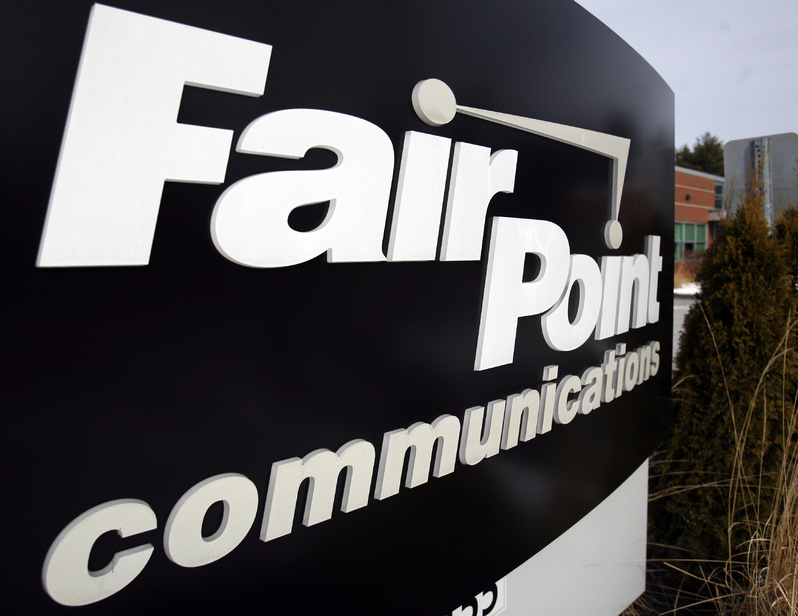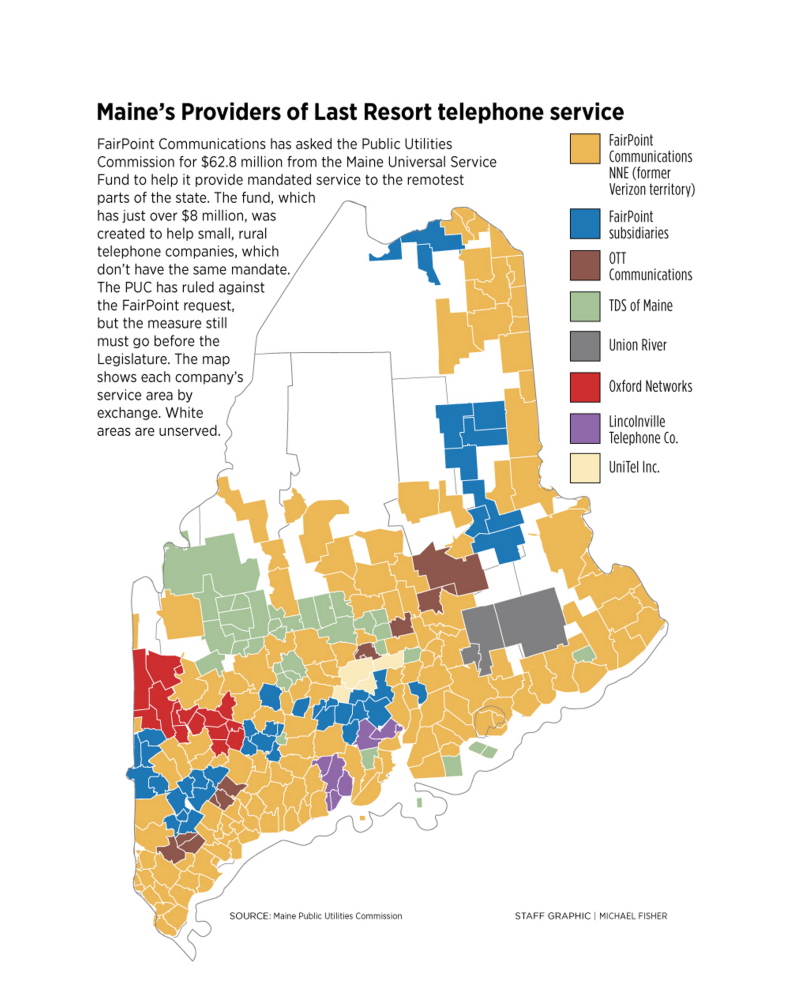The Maine Public Utilities Commission has decided that FairPoint Communications is not entitled to a $62.8 million subsidy it requested from the state to meet its mandate to provide basic telephone service to people in the most remote corners of Maine.
The order, released Nov. 21, is not binding. It will be included in a larger report that the PUC is preparing for the Legislature, which wants to weigh in on whether to subsidize FairPoint as the state’s “provider of last resort” – a mandate to provide basic service anywhere in the company’s service territory.
FairPoint accepted that designation when it bought Verizon’s landline network in 2008 for $2.4 billion. The term refers to the concept of Universal Service – the notion that everyone is entitled to basic telephone service no matter where they live.
The PUC was asked to answer nine questions for the lawmakers concerning FairPoint’s request, and to rule on whether the idea of Universal Service should be changed in an era of telecommunications dominated by cellphones and other mobile devices. One of those questions was whether FairPoint should be entitled to a subsidy from the Maine Universal Service Fund, which is funded by a fee on all phone bills, whether for a landline or cellphone and regardless of the service provider.
“So we went through the rate case process to see if we could answer that question intelligently,” Tom Welch, chairman of the PUC, said Tuesday.
He said the agency’s three commissioners were not convinced, based on the evidence provided by FairPoint, that any subsidy is required. However, Welch stressed that the PUC’s order does not rule out the creation of some future framework to subsidize FairPoint’s network.
“It certainly doesn’t preclude some different finding based on further evidence,” he said.
FairPoint has argued that the market has fundamentally changed and made it harder for the company to justify the cost of maintaining its network in rural areas where customers, and therefore revenue potential, are thin. It is seeking the $62.8 million from the Maine Universal Service Fund, which collects roughly $8.3 million a year from fees.
If the company receives the subsidy, everyone in the state who pays a phone bill would see their monthly bill increase by several dollars.
The Maine Universal Service Fund money is used to support Maine’s small rural telephone companies, such as OTT Communications and Oxford Networks. FairPoint, like its predecessor Verizon, has never received nor requested money from the Maine Universal Service Fund until now.
The company has not threatened to pull service from the rural areas that are expensive to serve if it doesn’t receive the subsidy. But it has claimed that it would be unconstitutional if the state does not grant the subsidy, citing the “takings” clause of the Fifth Amendment, according to the PUC’s order.
Jeff Nevins, FairPoint’s spokesman, did not return a phone call seeking comment Tuesday evening.
The PUC subsidy decision will be part of a report to the Legislature. Other questions the report will attempt to answer include: Can the state ensure universal access to telephone service without maintaining the basic service mandate? What areas of the state are the most expensive for FairPoint to serve, and therefore the most at risk if FairPoint receives limited or no financial subsidy? Could the basic service mandate be amended so other service providers fulfill that function?
FairPoint, the North Carolina-based company that is Maine’s largest incumbent carrier, argued that it requires the subsidy – the original request was for $67.6 million, but that was reduced to $62.8 million during the proceedings – to meet the costs of maintaining its network to provide service at any point to each of the approximately 630,000 customer locations in FairPoint’s service territory. The company claims it currently has 29,000 customers who pay only for basic telephone service.
The company also is challenged by a strike that started in mid-October after months of fruitless negotiations with two of its unions in northern New England. The company is seeking to trim $700 million from its operational costs, primarily through contract concessions.
Although the PUC’s report will influence lawmakers, the service debate will play out in the next legislative session.
State Rep. Barry Hobbins, a Democrat from Saco who was co-chairman of the Legislature’s utilities and energy committee last session, does not think it’s good public policy to subsidize FairPoint, at least to the extent requested. It was Hobbins who submitted the bill requiring the Legislature to weigh in before a decision was rendered on FairPoint’s subsidy request.
Welch expects the PUC to deliver its report to the Legislature next month.
“With this particular information, the next Legislature would be able to make some prudent decisions next year regarding (basic) service … rather than flying blind,” Hobbins said last May.
Whit Richardson can be contacted at 791-6463 or at wrichardson@pressherald.com
Twitter: whit_richardson
Send questions/comments to the editors.




Comments are no longer available on this story